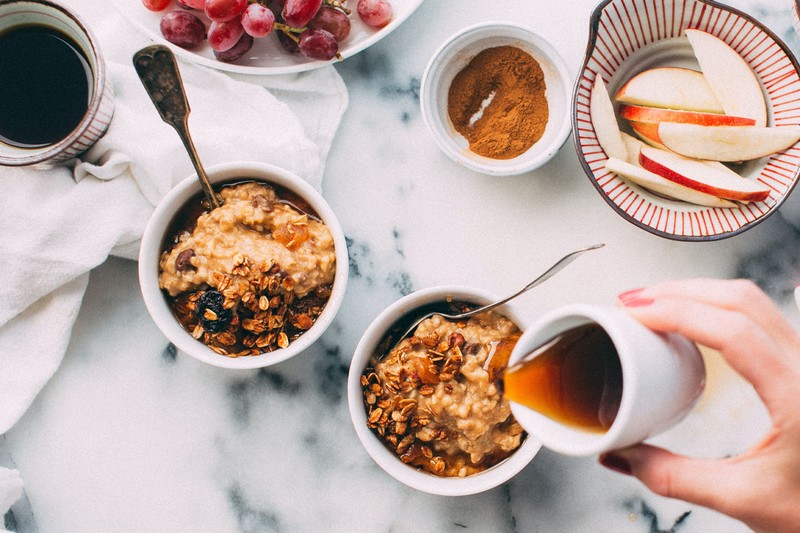The Pros & Cons Of Skipping Breakfast
PROS
“If you like to exercise first thing in the morning, exercising on an empty stomach can have some benefits – having fasted overnight, you are likely to burn fat as an energy source. It can feel better exercising without the weight of digestive processes. Short-term fasting (pushing back your breakfast time) can also increase your brain’s production of ‘brain-derived neurotrophic factor’, which can improve cognitive function. In effect, your brain function sharpens up to enhance your chances of sourcing food. This is, however, a short-lived effect, and the prolonged overnight fast should be broken with a healthy meal.” – Alison Cullen, nutritional practitioner at A.Vogel
“Skipping breakfast can help you stay in tune with your hunger cues. Quite often we get ourselves in a routine of having breakfast as soon as we wake up, but allowing yourself some time between waking up and eating will allow you to decide when you’re hungry and how hungry you are. This helps us to eat what our body needs.” – Jess Hillard, sports nutritionist at Warrior
“Skipping breakfast can be beneficial for controlling calories or losing weight. It can reduce total daily caloric intake and is often used by those practising intermittent or time-restricted fasting. In addition, there is the potential for extra fat burning for energy, and improved insulin sensitivity, which is helpful for those heading towards or in a diabetic state.” – Vanessa O'Brien, nutritional therapist & health coach
“Intermittant fasting reduces the daily eating window and may be beneficial for habitual morning eaters who are looking to implement simple lifestyle changes in order to facilitate an energy deficit. While the decision to eat breakfast or not does not directly determine weight loss, intermittent fasting has been linked with health benefits such as improved glucose regulation, decreased inflammation and eventual fat loss.” – Tim Hart, nutritionist & personal trainer at Third Space London
“In one of the first human trials of time-restricted eating, carried out with the help of the University of Surrey, two groups of healthy volunteers ate the same food, but the group on a time-restricted eating plan (eating breakfast 90 minutes later than usual, and dinner 90 minutes earlier each day) lost more body fat and saw bigger falls in blood sugar levels and cholesterol than the control group.” – Dr Michael Mosley, creator of The Fast 800
“Some people find that skipping breakfast is a way to give their digestive system time to do a clear out and repair. We live in a world where food is readily available, and this puts a burden on the digestive system having to work overtime.” – Dana Chapman, registered nutritionist & in-house expert at Rollagranola
“Skipping breakfast can simplify your morning routine and save time, allowing you to get a head start on your day. Additionally, for some people, skipping breakfast can lead to increased mental clarity and productivity, as they may not experience the post-meal energy slump that can occur after consuming an overly heavy breakfast. Some individuals find they have better appetite control and reduced overall calorie intake when they skip breakfast, which can be helpful for weight management if done in a safe and sustainable way.” – Brea Lofton, nutritionist & registered dietitian at Lumen

CONS
“Not everyone’s constitution will suit skipping breakfast; those with a fast metabolism and tendency towards wobbly blood sugar will not be able to sustain a morning – especially one that includes a workout – on no food. Instead, they are more likely to reach for caffeine and sugar to power them through. Blood sugar dips reduce brain function. You’ll feel fuzzy and desperately seek that quick sugar fix, kicking off a day of peaking and plummeting blood sugar levels, leaving you feeling exhausted and foggy.” – Alison
“Sometimes a ‘no breakfast’ approach can spin the opposite way – especially if you start to ‘ban’ yourself from eating in the morning, even if you’re hungry. An attitude of not allowing yourself to eat at a certain time can lead to negative complications and severe consequences. This may not be for everyone and can vary with different people, but I would never advise putting a ban on yourself at certain mealtimes.” – Jess
“My personal and professional view is that there are not many occasions where we should skip breakfast. Breakfast is the first meal you eat after you’ve fasted through the night; your body has been working hard repairing cells and you want to refuel in the morning with a nutrient-dense breakfast. How we start the day can impact what we crave and eat for the rest of the day. If you want to skip a meal for intermittent fasting purposes to give your digestion a rest, skipping an evening meal (at the right point in your cycle if you’re a female) may be a better option.” – Kate Booker, nutritionist at Nutrition Geeks
“Breakfast kickstarts the metabolism, helps to stabilise blood sugar and brings essential nutrients into the body. Missing out on breakfast can increase cravings later in the day, and lead to overeating towards the end of the day, especially if insufficient calories have been eaten. It can also be very stressful on the body, which is why I rarely recommend it to my menopausal clients, who are often already struggling with poor thyroid and/or adrenal function. For them, skipping breakfast can be a disaster.” – Vanessa
“Breakfast is an opportunity to refuel your body, so those who decide to skip breakfast should closely monitor their energy levels and the impact this is having on their physical activity. For some people, missing breakfast can cause tiredness, which results in less bodily movement throughout the day, which can then negatively impact overall physical and mental health. Ultimately, the decision of whether to skip breakfast or not is highly dependent on individual needs. Assessing the structure and energy expenditure of your day, such as whether you’ll be doing desk or manual work, can help to inform whether it’s wise to skip breakfast or not.” – Tim
“Skipping breakfast can be an added stress on the body. Cortisol – our stress hormone – is reduced by eating breakfast. If we skip breakfast this can lead to higher cortisol levels throughout the day, which can lead to weight gain around the middle, imbalanced sex hormones and disturbed sleep. Women of childbearing age and those going through perimenopause should be mindful of skipping breakfast as this can have an impact on progesterone levels, which I like to refer to as the calm to the oestrogen storm. More than that, if you skip breakfast, you are missing an opportunity to nourish your body – and our bodies need nutrients to perform optimally.” – Dana
“Breakfast doesn’t necessarily kickstart your metabolism, as your metabolism is actually working 24/7, but eating breakfast does provide you with energy and nutrients which support the body to function optimally. Metabolism is all about the chemical processes happening inside your body that keep it functioning correctly. With regard to food intake and breakfast, having irregular eating patterns has been shown to negatively disrupt your metabolic processes, which may put you at a higher risk of developing metabolic disorders such as diabetes. It’s also important to have regular meals in general as this supports appetite regulation and other metabolic processes.” – Ro Huntriss, lead clinical dietitian & nutritionist at EXALT
“Skipping breakfast and waiting too long to eat can lead to digestive discomfort when a person finally eats after an extended fasting period, particularly if they consume a large meal when they finally do eat. Some studies suggest chronic breakfast skipping may have adverse effects on metabolism, insulin sensitivity and weight management, although the findings are mixed. Skipping the first meal of the day may lead to erratic blood sugar levels and increased risk of hypoglycemia (low blood sugar) in some individuals. This can contribute to feeling weak or fatigued as the day progresses, and for some people, can lead to shakiness, inability to focus or perform, and more. The effects of breakfast on health and well-being can vary among individuals, and factors like age, activity level and dietary choices play a role in determining the most appropriate eating pattern. If you're considering skipping breakfast or any meal of the day, it's advisable to consult with a healthcare professional or registered dietitian to ensure it aligns with your specific health goals.” – Brea
*Features published by SheerLuxe are not intended to treat, diagnose, cure or prevent any disease. Always seek the advice of your GP or another qualified healthcare provider for any questions you have regarding a medical condition, and before undertaking any diet, exercise or other health-related programme.
DISCLAIMER: We endeavour to always credit the correct original source of every image we use. If you think a credit may be incorrect, please contact us at info@sheerluxe.com.


